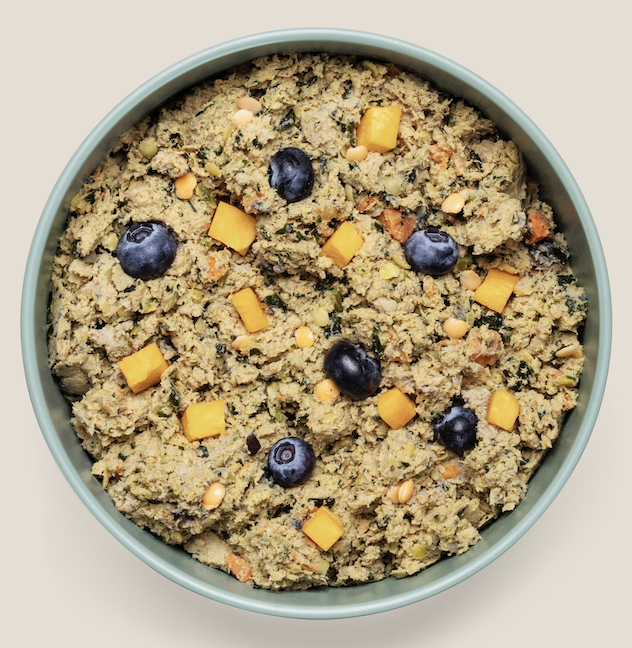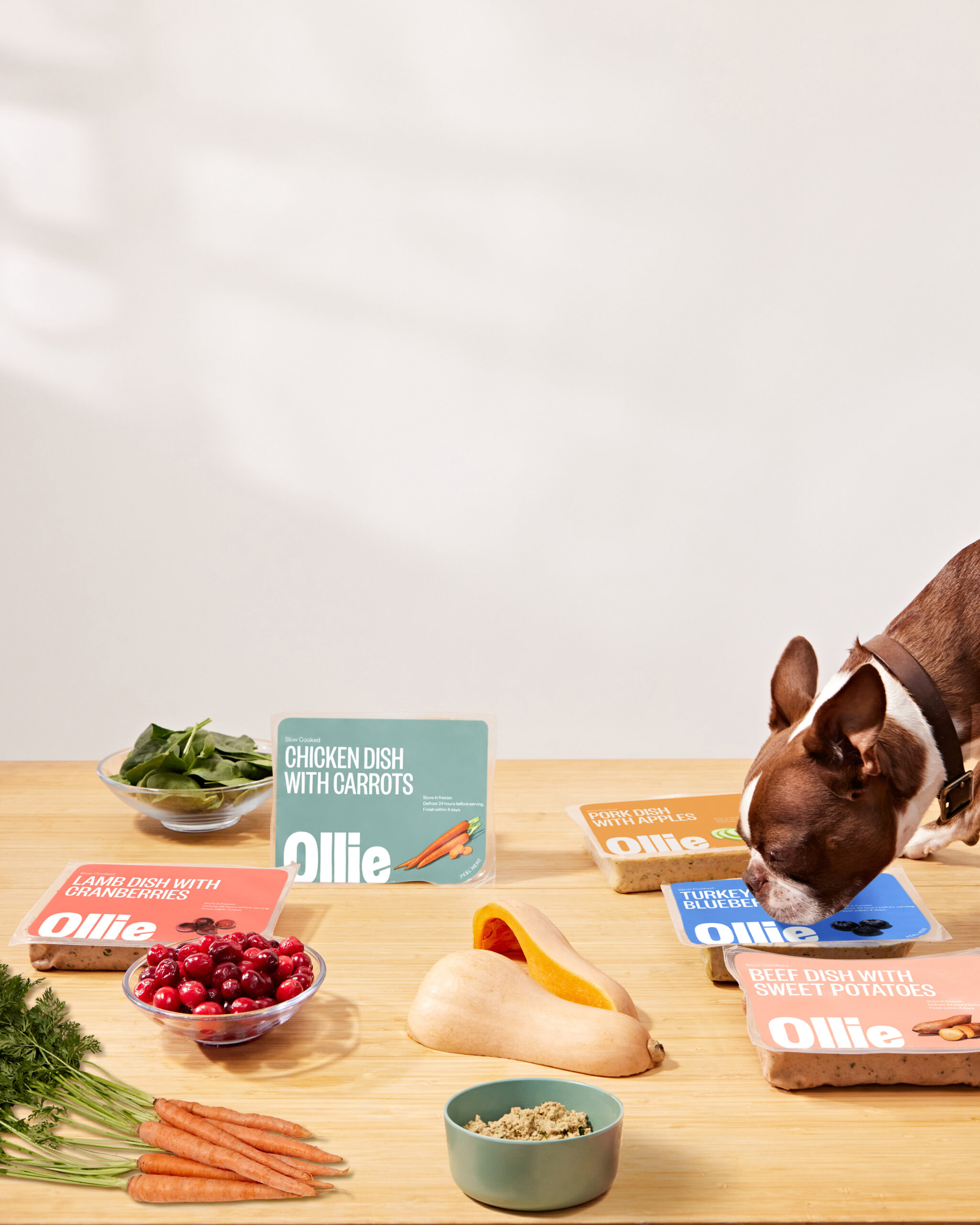Hey Ollie blog readers! We’re offering you an exclusive 60% OFF your starter box! Try now!
Your dog’s heart powers their entire body, but did you ever consider that what goes in their bowl powers their heart? Along with regular exercise and veterinary check-ups, feeding a nutritious diet filled with heart-healthy foods for dogs can play an important role in supporting your pup’s heart function and preventing some forms of heart disease.
Here are some qualities and ingredients that make a dog food heart-healthy and tips on how to show your dog some love by boosting their bowl for optimum heart health.
Top Heart-Healthy Foods For Your Dog
Whether you decide to make the switch to a heart-healthy fresh food diet such as Ollie or simply want to add a few mix-ins to your pup’s bowl, the following ingredients are known for their powerful heart-health benefits.
- Fish — Fatty fish such as salmon, sardines, and mackerel are packed with omega-3 fatty acids to reduce inflammation and boost heart function.
- Animal proteins — Chicken, beef, pork, and lamb contain L-carnitine, an amino acid that is integral to heart health.
- Green leafy vegetables — Spinach and kale contain free-radical fighting antioxidants to help reduce heart muscle damage.
- Whole grains — Brown and white rice, oatmeal, and barley feature heart-healthy vitamins and fiber.
- Carrots, pumpkin, and sweet potatoes — Beta carotene (which is converted to vitamin A) and potassium-rich vegetables help to support your pup’s heart as well as their immune and digestive systems.
- Flaxseed oil —Flaxseed oil is rich in omega-3 and omega-6 fatty acids as well as lignans, which support cardiovascular health.
- Blueberries — Blueberries are packed with fiber and heart-healthy antioxidants that can reduce degenerative damage to the heart.
- Organ meat — Organ meats are superfoods for dogs. Hearts in particular are high in taurine and the only food source for enzyme CoQ10 which helps fight harmful oxidative stress in the body.
- Rosemary — This fragrant herb contains antioxidants that support the immune system and may reduce your pup’s risk for cancer and heart disease.
If your dog has been diagnosed with heart disease, ask your veterinarian before introducing new foods. Following your veterinarian’s diet recommendations and guidelines will ensure your pup doesn’t develop nutritional deficiencies that could worsen their condition.
Dietary Tips for Heart Healthy Dogs
Feed Your Dog High-Quality Protein
Restricted protein diets were once advised for dogs facing heart problems, but experts now know that reduced protein can lead to decreased muscle mass, which can be potentially fatal. Protein is essential for keeping dogs’ hearts healthy because it strengthens the heart muscle and supports contractility (i.e., the heartbeat). According to Dr. Carol Osborne, an integrative veterinarian with the Chagrin Falls Pet Clinic in Ohio, heart-healthy diets for dogs should consist of at least 25 to 30 percent high-quality lean protein such as chicken or salmon.
Find Out Which Protein is Best for Dogs!
Reduce Sodium Intake
As with humans, excessive dietary salt is unhealthy for dogs—especially those who are prone to heart disease. Even if your pup shows no signs, Dr. Osborne says it’s best to keep them on a low-sodium diet with less than 100 mg daily. Most importantly, keep them on a steady diet of heart-healthy foods for dogs because sudden sodium spikes can stress heart function (i.e., keep your pup away from salty human snacks like chips).
Keep Reading: Supplements for Dog Heart Health – Are They Necessary?
Feed Your Pup Omega-3 Fatty Acids
According to Dr. Osborne, omega-3 fatty acid-rich fish oils are an essential dietary component for all-around canine heart health. Omega-3 fatty acids reduce harmful inflammation and protect against abnormal heart rhythms. In one canine heart disease study, dog survival rates improved with omega-3 supplements. Natural omega-3 fatty acid sources include cod liver oil—which can be found in some fresh, natural foods—sardines, and salmon. Alternatively, omega-3 fatty acid dietary supplements can be added to your dog’s diet.
Taurine Helps with Heart Function
According to Dr. Osborne, supplementing your dog’s diet with taurine, an amino acid, helps with heart function—even when they’re healthy. Though vets aren’t entirely sure of taurine’s purpose, they do know that without it dogs can suffer from an enlarged heart—and that certain breeds such as Portuguese Water Dogs and Golden Retrievers are more prone to a deficiency. Taurine can be naturally found in cooked lamb and raw beef liver, or can be administered in supplement form if recommended by your veterinarian.
Learn more: What is Taurine & Why is it Important?
Weight Management
Keeping your pup at a healthy weight is crucial for preventing heart problems. “Portion control is essential, and that means no free feeding,” Dr. Osborne says. Balancing your dog’s diet is also important. At Ollie, we recommend a 1:1:1 ratio of high-quality meat protein, naturally occurring fats such as cod liver oil, and carbohydrates in the form of nutrient-dense starches, vegetables, and seeds. With fresh recipes from Ollie, you can rest assured your pup’s cardiac health remains strong with heart-healthy foods for dogs.
Dog Breeds That Are Susceptible to Heart Disease
No dog owner wants to think about their pup as vulnerable, but knowing your dog’s risk factors can help you make the best heart-healthy choices and potentially reduce or slow disease progression. The following dog breeds are genetically predisposed to heart disease and other cardiac conditions:
- Cavalier King Charles spaniels
- Dachshunds
- Doberman pinschers
- Miniature and toy poodles
- Boxers
- Golden retrievers
- Miniature schnauzers
Because each breed is susceptible to different heart-related problems, their disease onset, signs, and severity may vary. Familiarizing yourself with your dog’s breed-associated risks can help you identify early warning signs and stay proactive about their cardiovascular health. If you’re concerned about your pup’s heart disease risks, talk to your veterinarian about screening tests for heart-related disorders.
Dogs love with their whole heart, so they deserve a food that nourishes and fuels its every beat. Ollie’s fresh food recipes feature numerous heart-healthy foods for dogs and no pro-inflammatory artificial ingredients or preservatives.


Find Out Which Recipe Plan is Right for Your Dog’s Needs
Get 60% of your first box of Ollie’s fresh
delivered meals today!
The Ollie blog is devoted to helping pet parents lead healthier lives with their pups. If you want to learn more about our fresh, human-grade food, check out MyOllie.com.
Tagged As:

The nutrition your dog needs,
the food they want.

Enjoying our articles? Subscribe our Newsletters and get new articles directly to your inbox
You might also like
4 June 2025
7 MINS READ
Feed Their Future: Why Human-Grade Food Matters for Puppies
Among the many decisions you’ll make as a new pet parent, choosing the right food for your growing puppy is one of the most important. The quality of your puppy’s diet can impact their developme…
by Ollie Pets
4 June 2025
6 MINS READ
How Does Fresh Dog Food Compare to Homemade?
As pet parents become more conscious about what goes into their dog’s food bowl, many are considering alternatives to traditional kibble. Two increasingly popular options are fresh dog food and ho…
by Ollie Pets
4 June 2025
5 MINS READ
How Can Fresh Dog Food Help with Weight Management?
Maintaining a healthy weight is one of the most important aspects of your dog’s overall health and longevity. Being overweight or underweight can result in health complications and conditions that…







